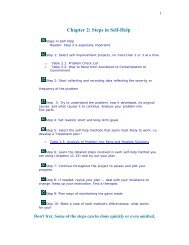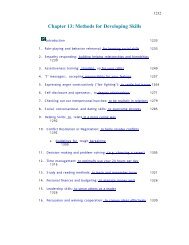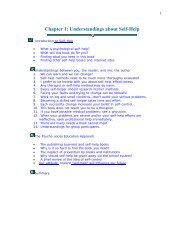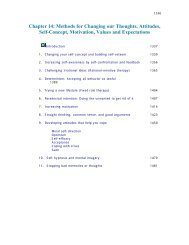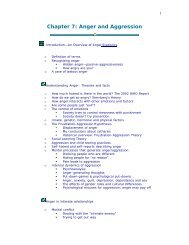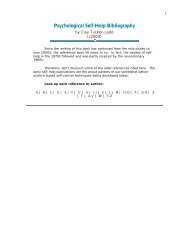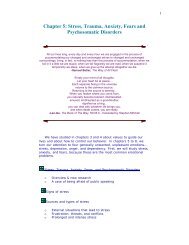Chapter 3: Values and Morals:Guidelines for living - Psychological ...
Chapter 3: Values and Morals:Guidelines for living - Psychological ...
Chapter 3: Values and Morals:Guidelines for living - Psychological ...
You also want an ePaper? Increase the reach of your titles
YUMPU automatically turns print PDFs into web optimized ePapers that Google loves.
esponses than a cold, suspicious, punitive situation. So be friendly<br />
<strong>and</strong> choose friends who are generous to others. As you might expect,<br />
if the situation poses some danger--like intervening in a family fight-we<br />
are less likely to offer help. There is some danger there. But, as<br />
you might not expect, research has also shown that the more people<br />
present at the scene of a crisis (<strong>and</strong>, thus, less dangerous), the less<br />
likely it is that a person will offer help, presumably because each<br />
person assumes that someone else will call an ambulance or give first<br />
aid, etc. (Staub, 1975). So look <strong>for</strong> things you can do. Don't assume<br />
that someone else will come to the rescue.<br />
Perhaps the most important awareness <strong>for</strong> you to have is this:<br />
knowing the steps involved in helping someone increases the<br />
likelihood (from 25% to 42%) that you or I will actually offer help.<br />
Thus, training programs are important; there one can practice by roleplaying<br />
helpful, empathic, <strong>and</strong> caring responses. "Affective education"<br />
where one listens to moral stories <strong>and</strong> discusses morals <strong>and</strong> moral<br />
dilemmas in small groups increases behavior considerate of others.<br />
Haan, Aerts, & Cooper (1985) concluded, however, that strictly<br />
academic or intellectual discussions of moral principles don't help us<br />
much. Instead, getting involved in a real group where real<br />
interpersonal conflicts arise <strong>and</strong> are worked out fairly is a great<br />
learning experience. We need to get emotionally involved <strong>and</strong><br />
experience the feelings, intentions, <strong>and</strong> actions of others when in<br />
conflict; we need to observe the consequences of others' actions when<br />
in moral dilemmas. Making a commitment to be helpful to others is<br />
also important (Staub, 1975; Maitl<strong>and</strong> & Goldman, 1974; Vitz, 1990).<br />
The heart has its reasons that reason doesn't know.<br />
-Pascal<br />
Altruism depends first on your liking <strong>and</strong> accepting others, second on<br />
your being concerned <strong>for</strong> others' welfare, <strong>and</strong> third on your feeling<br />
responsible <strong>for</strong> helping others in need.<br />
-E. Staub<br />
Latane' <strong>and</strong> Darley (1970) have described five steps in the<br />
complicated decision to help someone: (1) notice when someone is in<br />
trouble. Fears <strong>and</strong> shyness can cause us to ignore the needs of others.<br />
(2) Carefully determine if the person actually needs help. We are often<br />
prone to quickly assume they are all right. (3) Decide to personally<br />
take responsibility <strong>for</strong> helping the other person. Don't avoid a person<br />
in need. (4) Decide what you can do. Knowing first aid or having dealt<br />
with alcoholics, drug users, epileptics, flat tires, engine problems,<br />
divorces, parent-child conflicts, etc. increases the chances we will offer<br />
our help. (5) Per<strong>for</strong>m the helpful deed. In short, if you feel more<br />
43



